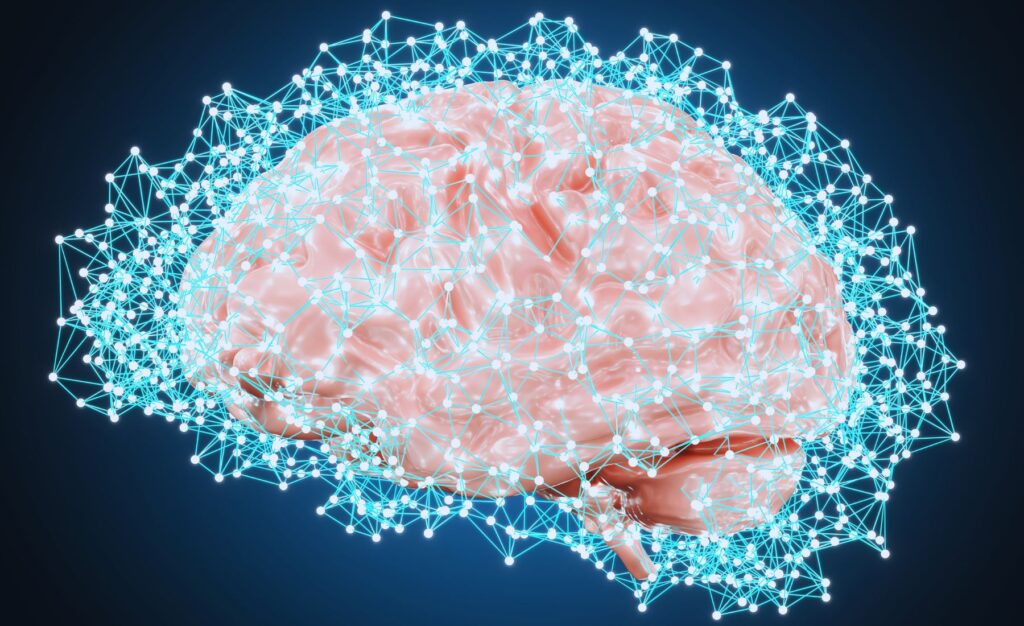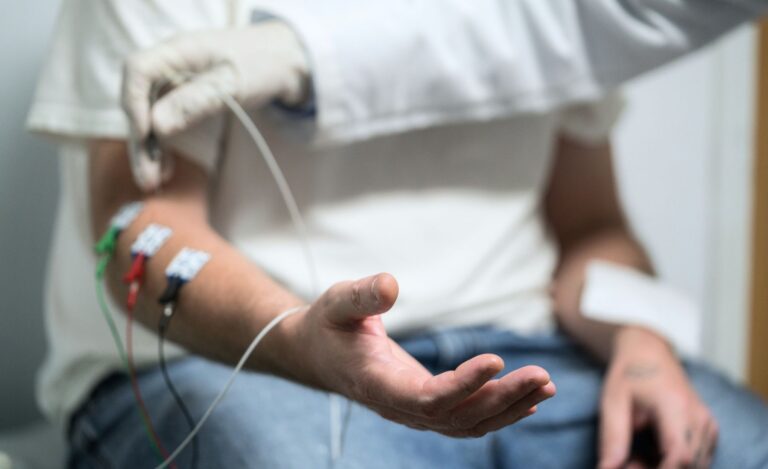Nerve damage, often referred to as peripheral neuropathy, is damage to the nerves or nervous system. Across the US, it is estimated that over 30 million people are affected by peripheral neuropathy. These conditions can negatively affect quality of life, leading to disabilities, chronic pain, limited mobility, and other symptoms.
While many nerve damage treatments are related to common nerve disorders, not all nerve damage is related to a disorder. Common causes of nerve damage can be linked to other factors, whether it is an injury, cancer or treatment, or even hormonal imbalances.
Note: Content on neuromedpa.com is not doctor’s advice and should not be taken as such. Always contact your primary care doctor for medical services, diagnosis, treatment, and more.
9 Common Causes of Nerve Damage
Nerve damage can affect any of the nervous systems throughout the body. These include the motor nervous system, sensory nerves, and autonomic nerves.
Motor nerves control movement of the muscles: walking, talking, grip, and general movement
Sensory nerves transmit senses throughout the body: cold and hot, light touches, cuts, scrapes
Autonomic nerves are the functions happening within the organs: breathing, heartbeat, digestion
Common causes of nerve damage can impact some, all, or varying levels of each nervous system. Neurologists can help treat common causes of nerve damage to help regain quality of life or focus on the symptoms for pain relief for non-treatable conditions.
1) Alcoholism
Toxins are responsible for a high amount of nerve damage within the body. Alcohol is a toxin, and high consumption of alcohol, often found due to alcoholism, can lead to lasting nerve damage.
Alcohol slowly destroys nerve tissue, leading to sensations like persistent burning or tingling throughout the body. Nerve damage from alcoholism cannot be treated once the damage has occurred. However, it is encouraged to stop drinking to prevent further damage and work on restoring quality of life without the condition worsening.
2) Autoimmune Diseases
Autoimmune diseases include conditions such as lupus, rheumatoid arthritis, celiac disease, sarcoidosis, Guillain-Barre syndrome, multiple sclerosis, and others. With an AI disease, patients are more likely to suffer from peripheral neuropathy and need to seek nerve damage treatment.
Autoimmune diseases attack the immune system, going after healthy tissue and damaging nerves along the way. Patients may experience weakness or loss of sensation that worsens over time as the disease progresses.
Autoimmune patients are recommended to seek treatment to help maintain quality of life and restore the progression of the disease as much as can be allowed.
3) Cancers and Chemotherapy Treatments
Tumors, both malignant and benign, can cause nerve damage by growing and pressing against the nerves, resulting in symptoms and side effects. Patients normally report numbness, weakness, or loss of sensation in affected areas that cause them to seek nerve damage treatment.
Although tumors can be removed, which can alleviate symptoms, chemotherapy can also cause peripheral neuropathy and nerve damage. Chemotherapy is a toxin used as a treatment that does not differentiate between healthy and non-healthy cells.
Nerve damage caused by chemotherapy is often relieved after chemotherapy stops, but nerve damage should be monitored in case of permanent damage. Patients seeking nerve damage treatment due to cancer or chemotherapy should also consider their diets and nutrients, as poor nutrient intake can also lead to peripheral neuropathy, a side effect of many cancers or their treatments.

4) Kidney Disease
The kidneys are responsible for removing waste from the body. When the kidneys fail, toxins can build up in the blood and cause nerve damage.
Nerve damage due to kidney disease or kidney failure can often be treated by dialysis or a kidney transplant to help restore proper kidney function and remove the toxins from the body. However, the lasting effects of the nerve damage before the treatment can vary based on the severity of the damage.
Patients may report weakness or loss of sensation in their limbs, leading to a consult and diagnosis to find the underlying issue of the nerve damage.
5) Diabetes
One of the leading causes of nerve damage is diabetes. Over 50% of all diabetics will develop peripheral neuropathy in time.
Long-term high blood sugar causes the nerves to swell and press against blood vessels, leading to nerve damage. Sensory nerve damage is most common, like loss of sensation in the limbs, primarily the feet, or general weakness in the limbs. In rare cases, motor nerves and autonomic nerves are also affected.
It’s important to seek regular treatment for diabetes and monitor blood sugar levels to help reduce the side effects and prolong the development of peripheral neuropathy.
6) Poor Nutrition
Conditions, diseases, and disorders are not the only causes of nerve damage. Yes, poor nutrition and nutrition deficiency can cause nerve damage. Most commonly, a lack of B12 or a vitamin B12 deficiency and, in some cases, a vitamin B6 deficiency.
B12 is responsible for an overall healthy nervous system. With a B12 deficiency, patients notice problems with sensation and movement. To counteract a B12 deficiency, it is recommended to take supplements or multivitamins, get B12 injections, and change dietary habits such as including red meat, fish, poultry, and eggs.
Deficiencies in vitamin B6 can be the result of excess alcohol consumption, poor nutrition, or a medical condition that affects the absorption of nutrients. It has also been known to cause sensory or movement issues due to nerve damage.
Medications for the treatment of HIV/AIDS, cancer, blood pressure, infections, and seizures can cause these deficiencies due to a lowered ability to absorb nutrients. Patients should monitor their diets closely and consult with their doctor to protect against nerve damage from poor nutrition.

7) Injury
Traumatic injuries can also cause nerve damage and cause patients to seek nerve damage treatment from neurologists. Car accidents, falls, sports injuries, broken bones, and even medical procedures can all lead to injuries that damage nerves by crushing or compressing them.
With nerve damage due to an injury or accident, there may be loss of sensation or weakness in the affected area. For some patients, they seek nerve damage treatment due to a slipped disk in the vertebrae that puts compression on the nerves and causes pain or numbness.
Not only injuries but casts can cause nerve pain during the healing process if they put extended pressure on the nerves. Also watch for repetitive or forceful activities that cause swelling of the ligaments or tendons that can narrow nerve pathways, leading to chronic pain or injuries that result in nerve damage.
8) Vascular and Blood Problems
Some vascular or blood problems can also lead to nerve damage. These issues decrease oxygen supply to the nervous system, leading to nerve tissue damage.
Examples include diabetes, smoking, and high blood pressure. They all narrow the arteries, leading to nerve damage. The inflammation of the scarring around thickened blood vessels impedes blood flow.
Be aware if any symptoms of nerve damage appear and seek nerve damage treatment to get ahead of it early – and detect the underlying cause.
9) Hormonal Imbalances
Normally the result of diabetes, conditions like hypothyroidism or menopause can also alter normal metabolic processes and cause nerve damage due to hormonal imbalances. Slowing metabolism, fluid retention, and swollen tissues are all reasons nerve damage occurs as a side effect of hormonal imbalances.
If diagnosed with an underlying condition, it is important to monitor hormone levels to avoid the side effects of nerve damage, which can lead to seeking nerve damage treatment for pain, numbness, loss of sensation, or weakness.

Symptoms of Nerve Damage
Without a diagnosis of an underlying cause, it can be difficult to know when to monitor for nerve damage and when to seek nerve damage treatment.
With the help of your primary care doctor, it is important to monitor your health regularly and stay tuned in to your body’s basic functions. Look for signs of nerve damage to seek peripheral neuropathy treatment before the condition worsens and find the underlying cause.
Muscle weakness
Cramping
Twitching
Painful tingling
Numbness
Loss reflexes
Vertigo or loss of balance
Loss of sensitivity to temperature
Digestive issues
Sharp, stabbing, or electric-like pain
Insomnia due to pain
Lack of coordination
Changes in heart rate or blood pressure

Seeking Nerve Damage Treatment
Common causes of nerve damage can be anything from an injury or repetitive motion to an underlying condition like diabetes or nutritional deficiency.
Catching nerve damage early is key to protecting your nerve function, reducing the symptoms, and finding the underlying cause to stop the spread. Working with both your primary care doctor and a neurologist can help treat the symptoms of nerve damage, manage the cause, and monitor the progression to preserve quality of life.
If you’re worried about nerve damage and need nerve damage treatment in Maryland, contact Neuro Med to schedule an appointment. Two locations serving Greenbelt, Laurel, and surrounding counties.

Neurological Medicine, P.A.
Neurological Medicine, P.A., provides comprehensive diagnostic and treatment services to patients with conditions affecting the brain, spinal cord, nerves, and muscles. We have been serving the Prince George’s and Montgomery County area since 1975, with two offices: Greenbelt and Laurel. We offer complete adult neurological care as well as in-office neurodiagnostic studies.
- Neurological Medicine, P.A.#molongui-disabled-link
- Neurological Medicine, P.A.#molongui-disabled-link
- Neurological Medicine, P.A.#molongui-disabled-link
- Neurological Medicine, P.A.#molongui-disabled-link



